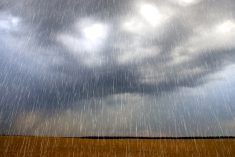MarketsFarm — An extreme heat wave affecting all four western provinces, the shores of the Mackenzie River in the Northwest Territories as well as Watson Lake, Yukon, is expected to persist for a week.
The “heat dome,” a high-pressure system trapping warmer air, has affected British Columbia the most. The village of Lytton, about 160 km southwest of Kamloops, on Sunday reached a daytime high of 46.6 C, breaking the national record reported in Midale, Sask. in 1937.
In total, 60 heat records were broken in B.C. on Sunday and an evacuation order was made in Pemberton Valley because snowmelt contributed to rising river levels. Schools on Vancouver Island and the Lower Mainland cancelled in-person classes on June 28, while community centres and churches were opening up cooling stations.
Read Also

Dryness poised to threaten Saskatchewan crops
Crops in Saskatchewan are developing in opposite directions, the province’s latest crop report said. Growing conditions in the province vary, with some areas receiving enough rain while other locations are experiencing crop stress due to hot, dry conditions.
The Lower Mainland may hit a high of 45 C on Monday, with the city of Abbotsford possibly reaching 50 C on the humidex. Kamloops is expecting six days above 40 C during the heat wave.
“This is headshaking for somebody like a climatologist, like myself. I mean, I like to break a record, but this is like shattering and pulverizing them,” Environment Canada senior climatologist David Phillips told CTV News on Saturday.
All of Alberta, most of B.C., central Saskatchewan and Flin Flon and The Pas in northwestern Manitoba are all under heat warnings from Environment Canada. All of the areas, except in Manitoba, are expected to either approach or exceed a high of 40 C.
The national weather agency advises people to watch out for the effects of extreme heat: swelling, rash, cramps, fainting, heat exhaustion, heat stroke and the worsening of some health conditions. The risks are greater for young children, pregnant women, older adults, people with chronic illnesses and people working or exercising outdoors.
If you or someone feels dizzy or disoriented, call 911 or your local emergency number.
— Adam Peleshaty reports for MarketsFarm from Stonewall, Man.
















